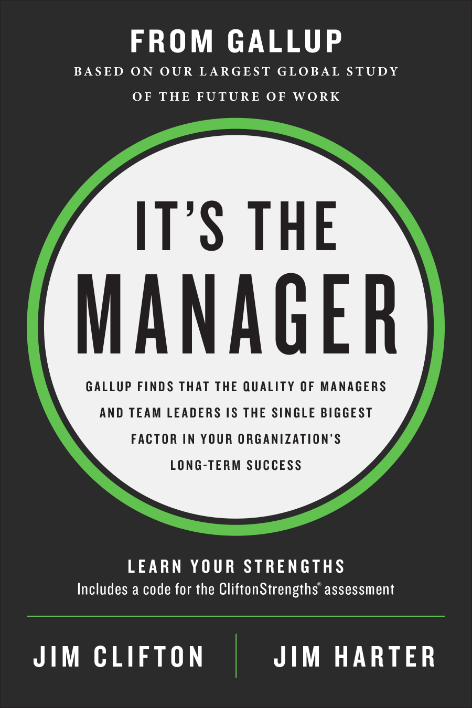Story Highlights
- The human connection between managers and employees drives engagement
- A remote worker's primary link to their organization is often their manager
- Great managers prioritize their people's wellbeing
What leaders did during the pandemic was done mostly in a temporary setting. No one knew what the post-COVID-19 future would look like. Now, it seems that hybrid work models -- those with employees on-site and remote -- will persist in the future of work.
That requires a more evolved strategy for people management. And as Gallup's State of the Global Workplace: 2021 Report shows, 80% of the world's workers are already not engaged or actively disengaged.
Disengagement is related to reduced profit, productivity, sales and tenure, which costs the global economy at least $7 trillion a year. Disengagement can also inhibit performance because it disincentivizes discretionary effort.
Engagement -- not pay -- spurs people to go the extra mile and give their best. Engagement creates commitment: Location does not. Gallup knows that neither hybrid work nor remote work will cause disengagement.
But we also know that the human connection between an employee and their manager drives engagement. When employees stop feeling engaged, they can disassociate from the organization and feel like they work for themselves -- rather like freelancers -- and not their company. And managers who aren't equipped to coach remote workers can easily disengage their people.
How managers catalyze engagement
More than anyone else, managers help employees feel that they are part of and valuable to the organization by building individualized, genuine relationships, which they accomplish by:
- Setting clear expectations. Managers must explain what top performance looks like, including the objectives of the individual, manager, team and company. Ideally, managers and employees should collaborate on setting fair and reasonable expectations that incorporate the employee's strengths. That motivates and inspires performance and sets employees up to succeed.
- Having frequent and ongoing coaching conversations. Gallup finds that most managers don't think they give effective feedback, and most employees, unfortunately, agree with them. Yet meaningful discussions about the work, opportunities to learn and grow, and the employee's successes and progress are tied to engagement. They improve performance as well, especially if those conversations are predicated on the employee's strengths. Gallup recommends that managers have at least one brief conversation per week with each employee to discuss their strengths and wellbeing and longer conversations focused on performance and career development at frequent intervals throughout the year.
- Holding people accountable for their performance. Cultures that promote accountability not only encourage compliance -- a key concern for leaders contemplating a hybrid future -- but also demonstrate the company's purpose and value system in real life. Managers must define what people are accountable for lest accountability feel unfair, and their feedback should be more course correction than punishment. Accountability can help employees learn and grow in their role, and it should be cascaded through an organization.
As managers learn in Gallup's Boss to Coach Journey, these behaviors show workers how their contribution fits in the larger organization. They have particular resonance in a hybrid situation, where managers are employees' primary link to the company. Used in connection with remote-work-specific management principles, expectations, coaching conversations and accountability, these coaching behaviors can earn employees' loyalty and give them a sense of belonging.
However, engaging -- much less, attracting and retaining -- high performers requires more. It requires relationships.
When employees stop feeling engaged, they can disassociate from the organization and feel like they work for themselves -- rather like freelancers -- and not their company.
Employees need to feel cared for
Feeling cared for comes from a manager-employee relationship developed in an ecosystem of care. Managers in that kind of cultural ecosystem pay attention to employees' wellbeing because they know it influences the work and the worker. They see employees as people and people management as coaching. And because they care about the employee as a whole person, managers actively invite employees' input.
That approach elevates the conversation beyond immediate work goals and gives employees room to bring their strengths, aspirations and energy to the organization. It allows people to feel like an important part of an organization, not an addendum to it. And those relationships can strengthen the employee's attachment to the organization, bond the individual with the organization's mission and purpose, and inspire discretionary performance.
Those qualities are as necessary in a hybrid situation as they are in the traditional workplace -- and just as powerful.
Meanwhile, many parts of the world are still in the thick of the pandemic, even as Gallup research shows that workers are more open to new jobs than ever before. A Gallup study, Exit Programs That Retain Stars and Build Brand Ambassadors, found that 52% of exiting employees say their former manager or company could have changed their mind about leaving but didn't try.
Compound those grim realities with the astronomical levels of disengagement and a future of hybrid workplaces, and it's clear that people have probably never needed a relationship with their manager as much as they do right now.
While some managers have the necessary tools and technology to set expectations and create accountability, many still need the capability and encouragement to build caring, productive relationships. Many managers were never trained as people managers at all. That's why Gallup's work with clients starts with the principles of engagement and coaching, then develops managers' higher-order practices, such as how to use their strengths and coach those of others.
Compound those grim realities with the astronomical levels of disengagement and a future of hybrid workplaces, and it's clear that people have probably never needed a relationship with their manager as much as they do right now.
That kind of manager development is a business necessity, as the pandemic made clear. When it started, we didn't know the global disengagement rate would reach 80%. We didn't know how many employees would work off-site. We didn't know what to expect at all. But we do now. And we know that engagement and wellbeing create more profitable, more resilient, more effective companies.
Knowing what we know now, the need for better people management is obvious -- and so is the strategy to create it.
Develop managers who create highly engaged employees:
- Partner with us to take the Boss to Coach Journey.
- Learn more about Gallup's leadership development framework.
- Attend the Create a Culture of Coaching webinar.





